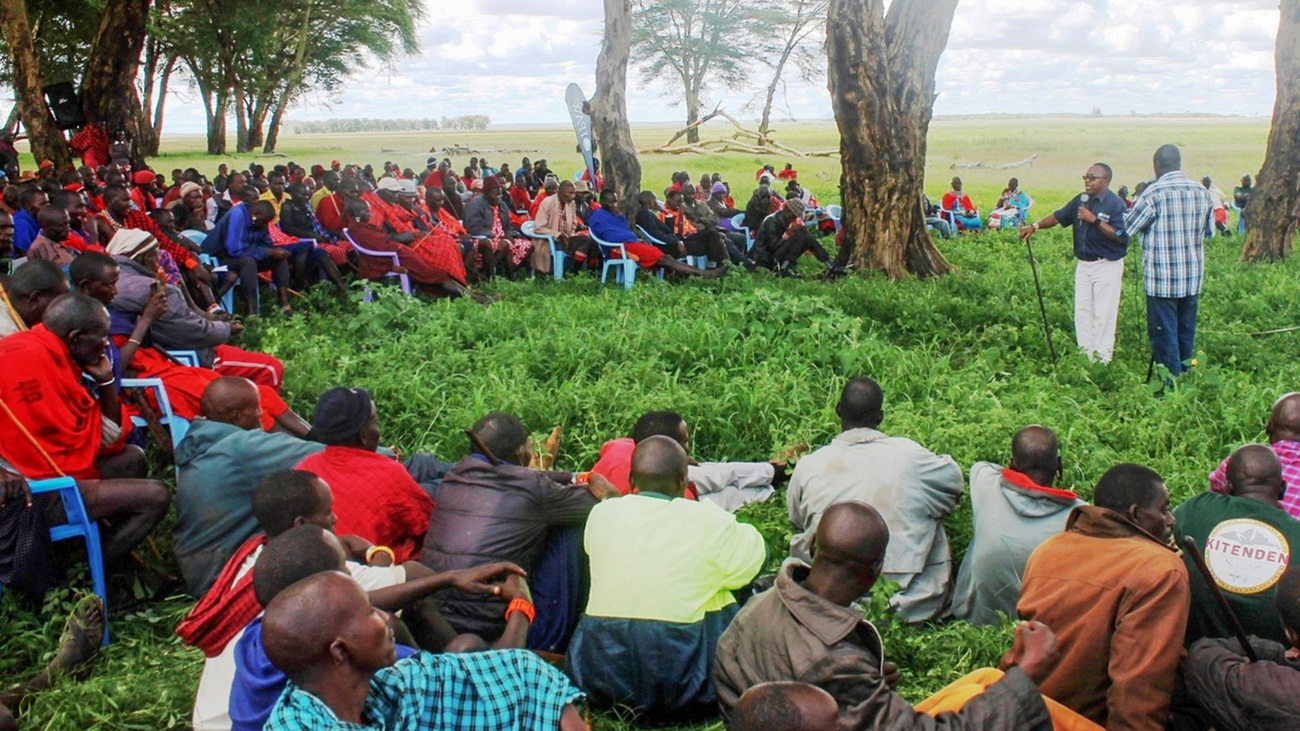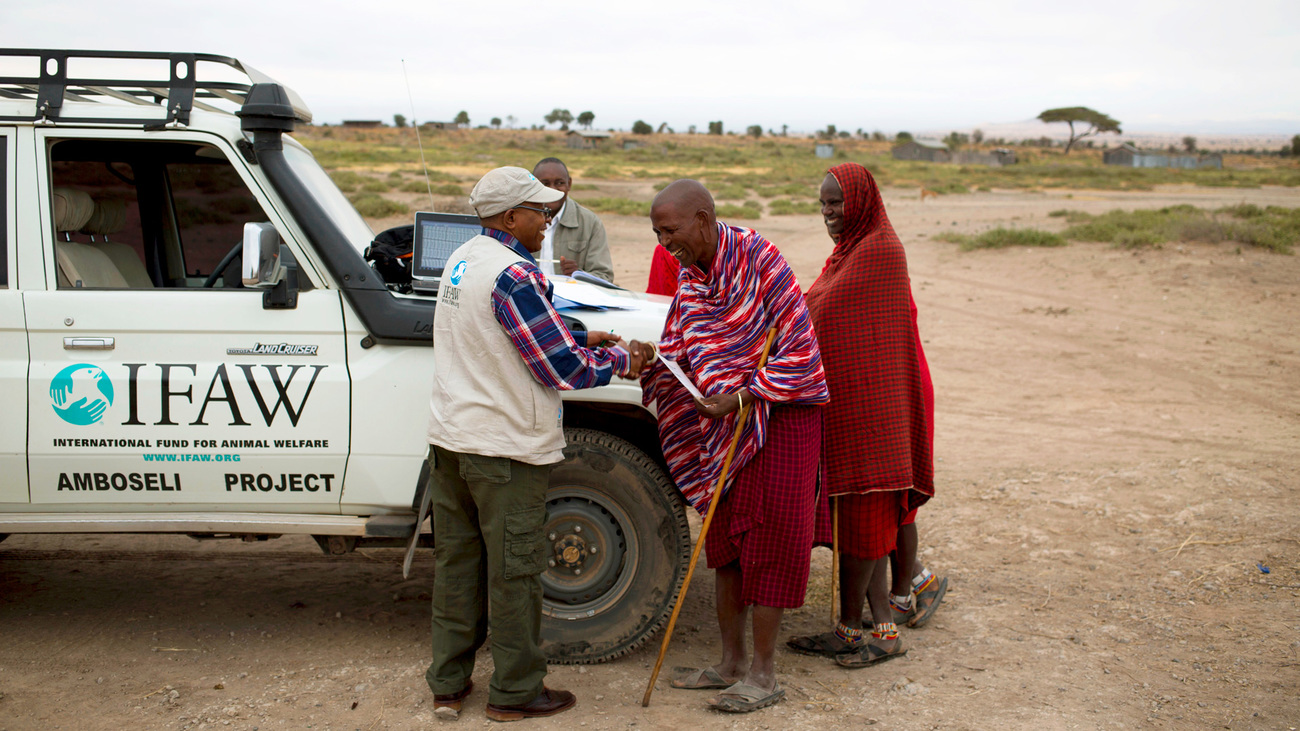Press releases
40 years after the whaling ban – whales continue to die
Read moreTraversing Kitenden to engage landowners with elephant conservation
In 2012, Evan Mkala and Bernard Tulito drove and trudged across vast hectares of land deep in the Kenyan wilderness for six months to convince thousands of landowners to create space for elephants and other wildlife.
In doing so, the two men helped build a conservation model that has become a global example of how communities, animals, and the application of conservation science can shape an entire ecosystem.
Thanks to their efforts towards one of IFAW’s boldest conservation initiatives, we established the Kitenden Conservancy from an initial 16,000 acres of communal land between Kenya’s Amboseli National Park and Mt. Kilimanjaro National Park in Tanzania, helping secure a critical migration route for African elephants that crosses the Kenya-Tanzania border. Since 2013, Kitenden has now grown to 26,000 acres.
Kitenden serves as proof that discrete and fragmented ecosystems, which face threats of population growth, land use changes, and climate change, can be merged through community-led conservation initiatives, sound judgement, and conservation goodwill.

Born and raised in Taita Hills on the fringes of Kenya’s Tsavo East National Park, Mkala learned about human-wildlife conflict as a child from the elephants that trumpeted through his village.
His experience sparked an interest that led him to study for a wildlife conservation and management degree. When he then became IFAW’s Amboseli Project Officer, he had only a laptop and a dream: to convince 1,600 landowners to sign up their 10-acre pieces of land in a lease agreement to secure space for elephants.
He was on unfamiliar ground, walking in the dark.
“IFAW was an unknown entity in Amboseli, and word had spread that we were coming to take people’s land,” Mkala recalls. “I had never negotiated a land lease, did not speak the local language. Where would I begin? How would I win their trust?”
He realized he needed to establish trust between IFAW and the locals.
“I immersed myself in the community, attended their functions, broke bread with them,” Mkala says. “In time, the morans (young warriors) accepted me, gave me a Maasai name—Menye Laiyok, or father of the morans.”
The community made it clear that they needed to understand each step of the lease agreement.
“I explained to every group I met that our interest went beyond merely leasing their land,” he says. “We were setting out to develop a wildlife conservancy owned and managed by the community, so that landowners could ‘milk’ elephants through tourism revenue and other benefits, as they would the cows they treasure.”
He credits Maasai community leader and chairman of the Olgulului-Ololarashi Group Ranch Mr. Daniel Leturesh for assuring the community that IFAW could be trusted.

Bernard Tulito, Community Liaison Officer, born in Amboseli and a landowner in Kitenden, became Mkala’s strongest ally and wingman.
Mkala and Tulito recall trekking across vast spaces of thorny scrubland with a surveyor, marking boundaries and enduring the scorching sun, ticks, and torn clothing. Next, they traveled from village to village, seeking out landowners and ascertaining that land share certificates matched the details on their map.
This meant setting off at 4 a.m., driving 100 kilometers daily on cattle tracks, and then walking from village to village, door to door, sometimes working until midnight by torchlight. Such are the nights they spent in the villages, or when their now battered little jeep broke down.
“The Olgulului-Ololarashi group ranch is four times bigger than Amboseli National Park,” Tulito explains. “Maasai villages and homes are scattered, so you can picture the vast terrain we had to cover and the amount of work required to get the signatures of 1,600 landowners.”
Mkala and Tulito faced challenges building trust among the diverse array of landowners. Convincing members of the local community, some of whom had never interacted with a bank, to open accounts where they could receive their lease payments and, collecting land share certificates—some of which were torn—called for patience, persuasion, and immense determination.
As a Kitenden landowner, Tulito says he is proud of what they achieved because he has been able to help provide his people with incentives such as employment at the Conservancy, livelihood projects for women, and scholarships for students. This, he says, has raised the value of their once-barren land and improved awareness for conservation within the community.
The experience was profound for Mkala, who describes securing Kitenden as the most challenging but most rewarding assignment of his career.
“Getting these leases signed pushed my endurance to the core, what with the heat, off-road driving, and long, daily treks,” he says. “But I have made lifelong friends here, built networks, impacted lives, and learned incredible lessons that will last me a lifetime.”
Every problem has a solution, every solution needs support.
The problems we face are urgent, complicated, and resistant to change. Real solutions demand creativity, hard work and involvement from people like you.
Unfortunately, the browser you use is outdated and does not allow you to display the site correctly. Please install any of the modern browsers, for example:
Google Chrome Firefox Safari